|
|
|
Sort Order |
|
|
|
Items / Page
|
|
|
|
|
|
|
| Srl | Item |
| 1 |
ID:
138297


|
|
|
|
|
| Summary/Abstract |
A pillar of American foreign policy in the Middle East since September 11, 2001, has been promoting democracy, with particular emphasis on support for women's representation. Given high levels of anti-Americanism in the region, does foreign pressure for policy reform undermine this project? Evidence from a nationally representative survey experiment in Jordan shows that an American endorsement of women in politics has no average effect on popular support for women's representation. Instead, domestic patterns of support and opposition to autocrats determine citizens' receptivity to policy endorsements, with policy endorsements of foreign-supported reforms polarizing public opinion. Both foreign and domestic endorsements of women in politics depress support among Jordanians who oppose their regime significantly more than among Jordanians who support it.
|
|
|
|
|
|
|
|
|
|
|
|
|
|
|
|
| 2 |
ID:
098231
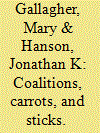

|
|
|
| 3 |
ID:
178733
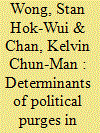

|
|
|
|
|
| Summary/Abstract |
Why would dictators purge members of their ruling coalition? Some argue that doing so can minimize the risk to dictators’ political survival, while others contend that dictators who mount purges are motivated by the desire to share resources with fewer allies. In this study, we analyze an original dataset, compiled from biographical data on the subordinates of the founding emperors of seven ancient Chinese imperial dynasties. Analyzing the data with competing risks models, we find that military experience is a strong predictor of political purges. Emperors were less likely to execute officers who had fought in more battles, but more likely to execute commanders, especially those who had established military credentials prior to the founding of an empire. In addition, the incidence of political purges heightened toward the end of an emperor’s life, which implies that the founding emperors were concerned about the security threats against their designated successors. Potential challengers came not only from the military, but also from the aristocracy. Indeed, we find that the blood relatives of the emperors were more likely to experience a mild form of purges: deprivation of titles. These findings suggest that dictators are more likely to use purges to reduce existential threats.
|
|
|
|
|
|
|
|
|
|
|
|
|
|
|
|
| 4 |
ID:
127118


|
|
|
|
|
| Publication |
2013.
|
| Summary/Abstract |
Do authoritarian leaders take preemptive actions to deter their citizens from joining cross-national waves of popular mobilizations against authoritarian rulers? Are they more likely to engage in such behavior when these uprisings appear to be more threatening-in particular, when they take place in neighboring countries and in regimes that resemble their own? We provide answers to these questions by comparing the responses of the Russian and Chinese leadership to two such waves: the color revolutions and the Arab uprisings. We conclude that, despite differences in the ostensible threats posed by these two waves, they nonetheless prompted the leaders of both of these countries to introduce similar preemptive measures in order to "diffusion-proof" their rule from the color revolutions and the Arab upheavals. These findings have some important implications for our understanding of authoritarian politics and diffusion processes. One is to reinforce the emphasis in many recent studies on the strategic foundations of authoritarian resilience. That recognized, however, we would add that the authoritarian toolkit needs to be expanded to include policies that preempt international, as well as domestic threats. The other is to provide further confirmation, in this case derived from the behavior of authoritarian rulers, of how scholars have understood the drivers of cross-national diffusion. At the same time, however, we counsel students of diffusion to pay more attention to the role of resisters, as well as to adopters. In this sense, the geographical reach of diffusion is much broader than many analysts have recognized.
|
|
|
|
|
|
|
|
|
|
|
|
|
|
|
|
| 5 |
ID:
175816
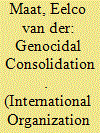

|
|
|
|
|
| Summary/Abstract |
Under conditions of guerrilla conflict, mass indiscriminate violence has been shown to effectively starve a guerrilla of its support. Consequently, counter-guerrilla mass violence is concentrated within territories where a guerrilla is dominant. However, in roughly 40 percent of mass violence episodes (e.g., Rwanda and Cambodia), the violence was aimed at populations within areas of secure territorial control. These episodes have therefore been explained by attributing ideological preferences to leaders or as unique cases only. I argue that leaders adopt mass indiscriminate violence against outgroups to consolidate power under conditions of elite rivalry. The violence serves two main goals. First, it helps build coalitions with constituencies that gain from violence; and second, it targets rival factions indirectly by forcing local security officials to facilitate or oppose the violence. The violence thereby provides rival supporters with an exit option, provides the regime with information on rival supporters’ private loyalties, and undermines rivals’ abilities to mount an effective resistance. These rivals can ultimately be purged from the regime. Based on newly collected original data on elite purges and on the type of mass indiscriminate violence for the years 1950 to 2004, I show that this type of mass violence, which I call “genocidal consolidation,” is intimately connected to authoritarian consolidation.
|
|
|
|
|
|
|
|
|
|
|
|
|
|
|
|
| 6 |
ID:
158538
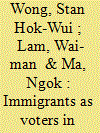

|
|
|
|
|
| Summary/Abstract |
Migration to electoral autocracies has become increasingly common. Extant studies, however, accord little attention to the immigrants' influences on the domestic politics of these regimes. We argue that immigrants have attributes (status quo bias and lack of prior exposure to local politics) that make them an attractive co-optation target of the authoritarian regime. We provide a case study of mainland Chinese immigrants in Hong Kong to illustrate our argument. Since the sovereignty transfer, the Hong Kong government has devised various schemes to attract these immigrants, while pro-establishment political parties and groups have actively sought to co-opt them. Using two distinct public opinion surveys, we also find that immigrants are more likely to approve of the political and economic status quo, and less likely to vote for pro-democracy opposition parties than the natives. In addition, we find no evidence that exposure to political information can change the immigrants' vote choice.
|
|
|
|
|
|
|
|
|
|
|
|
|
|
|
|
| 7 |
ID:
108524
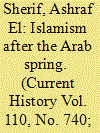

|
|
|
| 8 |
ID:
119192
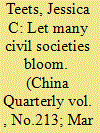

|
|
|
|
|
| Publication |
2013.
|
| Summary/Abstract |
In this article, I analyse civil society development in China using examples from Beijing to demonstrate the causal role of local officials' ideas about these groups during the last 20 years. I argue that the decentralization of public welfare and the linkage of promotion to the delivery of these goods supported the idea of local government-civil society collaboration. This idea was undermined by international examples of civil society opposing authoritarianism and the strength of the state-led development model after the 2008 economic crisis. I find growing convergence on a new model of state-society relationship that I call "consultative authoritarianism," which encourages the simultaneous expansion of a fairly autonomous civil society and the development of more indirect tools of state control. This model challenges the conventional wisdom that an operationally autonomous civil society cannot exist inside authoritarian regimes and that the presence of civil society is an indicator of democratization.
|
|
|
|
|
|
|
|
|
|
|
|
|
|
|
|
| 9 |
ID:
137206
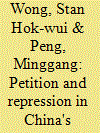

|
|
|
|
|
| Summary/Abstract |
China has established a petition system to elicit information about grievances. However, the petition system may have perverse effects because it also reveals to the center the failure of local-level officials to resolve those grievances. Anecdotal accounts suggest that local officials have incentive to silence petitioners, often with the use of repression. In this article we study whether non–regime threatening petitions would provoke local governments' coercive response. To tackle the endogenous relationship between petition and repression, we take advantage of a natural experiment afforded by a change in hydroelectricity policy in China. In particular, we use provincial hydropower outputs as an instrument to identify citizen petitions. We find that citizen petitions significantly increase a province's spending on its repressive apparatus. The results suggest a paradoxical outcome of China's petition system: while it may help reduce the national authority's use of repression, it has caused an explosion of repression within the authoritarian system as a whole.
|
|
|
|
|
|
|
|
|
|
|
|
|
|
|
|
| 10 |
ID:
096599


|
|
|
|
|
| Publication |
2010.
|
| Summary/Abstract |
Business interests are overrepresented in Hong Kong's nominally democratic political institutions. Many in Hong Kong perceive this as evidence of the existence of "collusion between government and business," a phenomenon that has stirred public concerns in the city since its sovereignty transfer. Although anecdotal accounts abound, no systematic analysis has been conducted to evaluate the validity of this perception. In this article I use a rich firm-level dataset to offer the first systematic assessment of the effects of political connections on firm performance in Hong Kong. I define politically connected firms as firms that have stakeholders concurrently holding a seat on the Election Committee, a constitutional body that elects the city's chief executive. I found evidence, though not overwhelming, consistent with the "collusion" hypothesis: political connections do improve firm performance measured by return on equity and market-to-book ratio. The improvement is unlikely due to unobserved confounding factors such as firms' inherent ability. As for the origin of the political connections, the data show that a firm's economic power has little predictive value of its connections to the Election Committee. Rather, number of employees matters; firms that hire fewer workers were more likely to gain a seat on the 1997 Election Committee. This result may suggest that Beijing plays a more dominant role in the formation of political connections-that serve Beijing's co-optation needs rather than the interests of powerful firms that may have a desire to "capture" the state.
|
|
|
|
|
|
|
|
|
|
|
|
|
|
|
|
| 11 |
ID:
192132
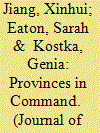

|
|
|
|
|
| Summary/Abstract |
China’s ‘Xi-Li era’ is said to be defined by both the concentration of power in the center and the strengthening of Party authority. In this paper, we ask whether these trends have been evident in local appointment practices since Xi Jinping took office in 2013. By comparing the career histories of 3,682 prefectural mayors and Party Secretaries under the Hu-Wen and Xi-Li administrations, we find that while appointment practices have shifted, the observed changes are not wholly consistent with the center- and Party-strengthening narratives. First, developments in the Xi-Li era suggest that while provincial authorities are increasingly using prefectural appointments for their own ends, the center remains high and far away in these decisions. Second, we do not find evidence that cadres with a strong Party background have a particular advantage in the Xi period. Instead, cadres with strong track records in key functional xitong, particularly those with an economic profile, are still the most likely to attain leadership positions. These findings contribute to the current debate on the nature of power reconfigurations unfolding in Xi’s China.
|
|
|
|
|
|
|
|
|
|
|
|
|
|
|
|
| 12 |
ID:
133015
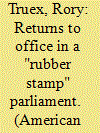

|
|
|
|
|
| Publication |
2014.
|
| Summary/Abstract |
Are there returns to office in an authoritarian parliament? A new dataset shows that over 500 deputies to China's National People's Congress are CEOs of various companies. Entropy balancing is used to construct a weighted portfolio of Chinese companies that matches companies with NPC representation on relevant financial characteristics prior to the 11th Congress (2008-2012). The weighted fixed effect analysis suggests that a seat in the NPC is worth an additional 1.5 percentage points in returns and a 3 to 4 percentage point boost in operating profit margin in a given year. Additional evidence reveals that these rents stem primarily from the "reputation boost" of the position, and not necessarily formal policy influence. These findings confirm the assumptions of several prominent theories of authoritarian politics but suggest the need to further probe the nature of these institutions.
|
|
|
|
|
|
|
|
|
|
|
|
|
|
|
|
| 13 |
ID:
189973
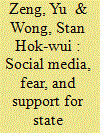

|
|
|
|
|
| Summary/Abstract |
Even in authoritarian regimes that enforce vigorous information controls, netizens are still able to access fairly diverse – sometimes even sensitive – information from social media than from traditional media. We argue that this ‘breathing space’ in social media may have an indirect positive effect on regime stability via a subtle emotional channel; exposure to news on social media heightens one’s generalized fear, which in turn increases one’s demand for social controls by the state. We test our argument using an original survey that evaluates public support for China’s social credit system. We find that the support for this seemingly all-encompassing surveillance system is positively correlated with one’s generalized fear, while one’s generalized fear is positively correlated with one’s exposure to news on WeChat, the most popular social media platform in China.
|
|
|
|
|
|
|
|
|
|
|
|
|
|
|
|
| 14 |
ID:
178847
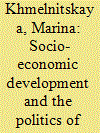

|
|
|
|
|
| Summary/Abstract |
Russia’s 2018 presidential election campaign was accompanied by a new round of strategies of socio-economic development. This article analyses these documents from the perspective of the ‘politics of expertise’ defining the relations between the political regime and policy experts. The analysis draws on authoritarian politics and public policy literatures. The article argues that a ‘hollow paradigm’ approach to the politics of expertise has emerged in response to the dilemmas of authoritarian governance. While the substantive, ideational element of this paradigm is vague, its procedural, expert community-binding element is strong. The analysis contributes to the understanding of the politics surrounding the writing of strategic plans, the role of policy ideas and state–society relations in contemporary Russia.
|
|
|
|
|
|
|
|
|
|
|
|
|
|
|
|
|
|
|
|
|